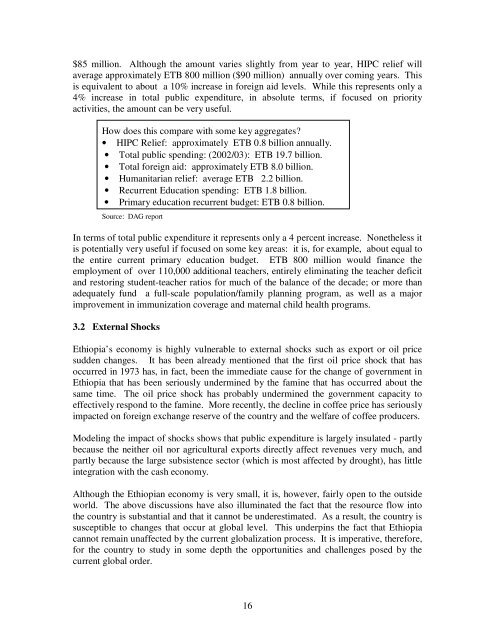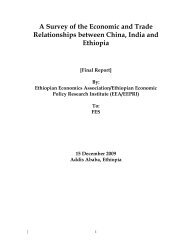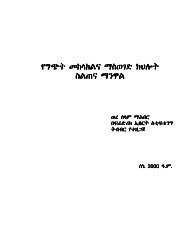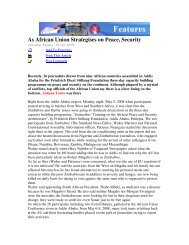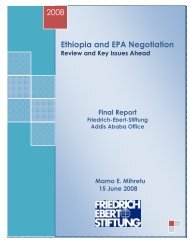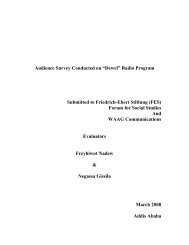external influence in the making of development ... - FES Ethiopia
external influence in the making of development ... - FES Ethiopia
external influence in the making of development ... - FES Ethiopia
You also want an ePaper? Increase the reach of your titles
YUMPU automatically turns print PDFs into web optimized ePapers that Google loves.
$85 million. Although <strong>the</strong> amount varies slightly from year to year, HIPC relief will<br />
average approximately ETB 800 million ($90 million) annually over com<strong>in</strong>g years. This<br />
is equivalent to about a 10% <strong>in</strong>crease <strong>in</strong> foreign aid levels. While this represents only a<br />
4% <strong>in</strong>crease <strong>in</strong> total public expenditure, <strong>in</strong> absolute terms, if focused on priority<br />
activities, <strong>the</strong> amount can be very useful.<br />
How does this compare with some key aggregates?<br />
• HIPC Relief: approximately ETB 0.8 billion annually.<br />
• Total public spend<strong>in</strong>g: (2002/03): ETB 19.7 billion.<br />
• Total foreign aid: approximately ETB 8.0 billion.<br />
• Humanitarian relief: average ETB 2.2 billion.<br />
• Recurrent Education spend<strong>in</strong>g: ETB 1.8 billion.<br />
• Primary education recurrent budget: ETB 0.8 billion.<br />
Source: DAG report<br />
In terms <strong>of</strong> total public expenditure it represents only a 4 percent <strong>in</strong>crease. None<strong>the</strong>less it<br />
is potentially very useful if focused on some key areas: it is, for example, about equal to<br />
<strong>the</strong> entire current primary education budget. ETB 800 million would f<strong>in</strong>ance <strong>the</strong><br />
employment <strong>of</strong> over 110,000 additional teachers, entirely elim<strong>in</strong>at<strong>in</strong>g <strong>the</strong> teacher deficit<br />
and restor<strong>in</strong>g student-teacher ratios for much <strong>of</strong> <strong>the</strong> balance <strong>of</strong> <strong>the</strong> decade; or more than<br />
adequately fund a full-scale population/family plann<strong>in</strong>g program, as well as a major<br />
improvement <strong>in</strong> immunization coverage and maternal child health programs.<br />
3.2 External Shocks<br />
<strong>Ethiopia</strong>’s economy is highly vulnerable to <strong>external</strong> shocks such as export or oil price<br />
sudden changes. It has been already mentioned that <strong>the</strong> first oil price shock that has<br />
occurred <strong>in</strong> 1973 has, <strong>in</strong> fact, been <strong>the</strong> immediate cause for <strong>the</strong> change <strong>of</strong> government <strong>in</strong><br />
<strong>Ethiopia</strong> that has been seriously underm<strong>in</strong>ed by <strong>the</strong> fam<strong>in</strong>e that has occurred about <strong>the</strong><br />
same time. The oil price shock has probably underm<strong>in</strong>ed <strong>the</strong> government capacity to<br />
effectively respond to <strong>the</strong> fam<strong>in</strong>e. More recently, <strong>the</strong> decl<strong>in</strong>e <strong>in</strong> c<strong>of</strong>fee price has seriously<br />
impacted on foreign exchange reserve <strong>of</strong> <strong>the</strong> country and <strong>the</strong> welfare <strong>of</strong> c<strong>of</strong>fee producers.<br />
Model<strong>in</strong>g <strong>the</strong> impact <strong>of</strong> shocks shows that public expenditure is largely <strong>in</strong>sulated - partly<br />
because <strong>the</strong> nei<strong>the</strong>r oil nor agricultural exports directly affect revenues very much, and<br />
partly because <strong>the</strong> large subsistence sector (which is most affected by drought), has little<br />
<strong>in</strong>tegration with <strong>the</strong> cash economy.<br />
Although <strong>the</strong> <strong>Ethiopia</strong>n economy is very small, it is, however, fairly open to <strong>the</strong> outside<br />
world. The above discussions have also illum<strong>in</strong>ated <strong>the</strong> fact that <strong>the</strong> resource flow <strong>in</strong>to<br />
<strong>the</strong> country is substantial and that it cannot be underestimated. As a result, <strong>the</strong> country is<br />
susceptible to changes that occur at global level. This underp<strong>in</strong>s <strong>the</strong> fact that <strong>Ethiopia</strong><br />
cannot rema<strong>in</strong> unaffected by <strong>the</strong> current globalization process. It is imperative, <strong>the</strong>refore,<br />
for <strong>the</strong> country to study <strong>in</strong> some depth <strong>the</strong> opportunities and challenges posed by <strong>the</strong><br />
current global order.<br />
16


